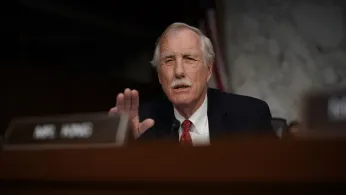
Jul 31
Senator Angus King Admits ‘Mistake’ in Confirming Missouri Judge Who Compared Marriage Equality to Bestiality
READ TIME: 3 MIN.
Senator Angus King, an Independent from Maine, stated this week that his Senate vote to confirm Joshua Divine to a lifetime appointment on the U.S. District Court in Missouri was “a mistake,” following public scrutiny over Divine’s record of opposing LGBTQ+ rights and promoting controversial views on marriage equality. In a statement to Capitol Hill reporters, King explained he had relied on the recommendation of Missouri Republican Senator Josh Hawley when casting his vote but later regretted not fully vetting Divine’s background, which includes a history of inflammatory statements against LGBTQ+ rights and abortion access .
Joshua Divine, now confirmed for a lifetime judicial seat, has an extensive record of opposing LGBTQ+ rights. As general counsel in Missouri, Divine fought against measures banning conversion therapy and challenged expanded protections for LGBTQ+ individuals. Notably, Divine has equated marriage equality to bestiality in public arguments, a comparison that LGBTQ+ advocates and civil rights organizations have condemned as deeply offensive and dehumanizing . These positions have raised alarm about Divine’s impartiality and commitment to equality under the law.
According to reports, Divine’s confirmation was secured by a narrow 51-46 Senate vote, with King as the only non-Republican to join the majority. Three senators did not vote. Senator Susan Collins of Maine, a Republican, also voted in favor . King’s office later clarified that he was unaware of the full extent of Divine’s anti-LGBTQ+ record at the time of the vote.
The response from LGBTQ+ organizations has been swift and critical. Advocates point to Divine’s appointment as part of a broader pattern of judicial nominations that threaten hard-won rights for LGBTQ+ people and other marginalized communities. Lisa Margulies, vice president of Planned Parenthood Maine Action Fund, characterized Divine’s appointment as a continuation of efforts to roll back reproductive and LGBTQ+ rights . National LGBTQ+ advocacy groups have also expressed concern that judges with histories of discriminatory rhetoric may undermine federal protections and impede progress toward equality.
The record of Divine’s public statements—including equating same-sex marriage to bestiality—has been cited as especially egregious, with advocates warning that such perspectives not only offend but could translate into biased judicial decisions affecting LGBTQ+ people nationwide .
Senator King’s admission has reignited debate about the Senate’s process for confirming federal judges. King himself acknowledged relying on a colleague’s recommendation rather than conducting a comprehensive review of Divine’s record, calling the decision a “mistake” and a learning moment for future nominations . Critics argue that the Senate must take greater care to scrutinize nominees’ records on civil rights, particularly those impacting LGBTQ+ people and other vulnerable groups.
King’s vote, though not decisive in the final outcome, has drawn particular attention because of his established support for LGBTQ+ rights and his reputation as an independent voice in the Senate. The incident raises questions about the responsibilities of senators in vetting judicial nominees and the systemic challenges of ensuring that lifetime appointees to the federal bench uphold principles of equality and justice for all.
As Joshua Divine assumes his judicial role, LGBTQ+ advocates are emphasizing the continued importance of vigilance and advocacy to protect civil rights in the courts. Organizations are calling on the Senate to strengthen its vetting procedures and for individual senators to more thoroughly research nominees’ records, especially concerning issues that disproportionately impact LGBTQ+ people.
The controversy has also sparked renewed calls for federal legislation, such as the Equality Act, which would codify comprehensive protections against discrimination based on sexual orientation and gender identity . As the debate over judicial appointments and LGBTQ+ rights continues, community leaders urge allies in government to prioritize inclusivity, transparency, and the safeguarding of fundamental rights for all Americans.






